What is common to all of them the assumption that it’s ok to ask someone to squeeze something more in. We ignore the illnesses, the anxiety, the overwork and ask for ‘just a little bit more.’ I have the feeling that this is something that many people will be familiar with. It’s something that happens to us and something many of us do to other people.
Perhaps one reason we do this is that we get so caught up in our own deadlines and worries that we can’t accept that what we had planned just isn’t going to happen. The report you really hoped to have in the newsletter won’t be getting written. The attendees at your event won’t be synchronised with each other. Once, when a speaker had to cancel their attendance at a meeting I’d organised, I didn’t get back to them for a week because I was too busy worrying about what I was going to do without them. In my own work I’ve come to think about time as a form of relationality. Our stories about time tell us what is it to be with others, or to not be with them. They also tell us what kinds of forms this ‘withness’ can take. This means that time can also be seen as a form of ethical encounter. If that’s so, what are we doing when we ignore other people’s claims that they don’t have the time? It seems that in order to treat the other ethically, you have to come to terms with your disappointment, let go of the anticipated future you had been working with, and then still have the generosity to be able to say to the person who has somehow let you down “Of course, no problems, hope things get better for you soon”. I had a lovely lesson in this when I witnessed a colleague deal with a keynote having to drop out of an event only a couple of weeks before the start date. The speaker had obviously wrestled with the guilt of doing this and was extremely apologetic. Almost immediately the reply came back that they would be missed, but it is far more important for them to take care of themselves, everyone would manage, and there was no need to feel bad. Even though it wasn’t directed to me, the kindness and compassion of it brought me to tears. I had this in mind when I was sitting in that network coordination meeting, listening to stressed people being asked to take on even more. I realised that sending them the email passwords ‘just in case’ would still add another thing to the pile of things they felt like they should be doing. So I objected and suggested that they should in fact be deliberately not sent the password so they wouldn’t have it at the backs of their minds. It was only a tiny little gesture, but it’s an event that stays with me because it reminds me that there are these kinds of ethical decisions to be made, and I hope I can learn to be more like my colleague, who focused on care rather than guilt. 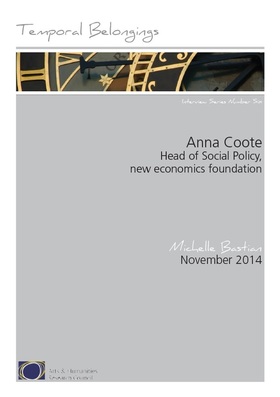 Two further interviews in the Temporal Belongings Series are available. In the first I talk with Anna Coote, Head of Social Policy at the new economics foundation. We focus particularly on her involvement in the 21 hours project and the accompanying edited collection Time on Our Side: Why we all need a shorter working week. In the second interview I talk with Katherine Gibson, an economic geographer and member of the Community Economies Collective about her most recent book Take Back the Economy: An Ethical Guide for Transforming our Communities as J.K. Gibson-Graham and with Jenny Cameron and Stephen Healy. Both are part of the Sustaining Time project, looking at the role of time in building more sustainable economies.
The Temporal Belongings project has now been running for three and a half years and I've been involved in organising eight events for the project (often co-organising with amazing colleagues) that have hosted over 200 participants. Throughout we've been experimenting with doing conferences differently. Borrowing ideas from unconferencing and the like we've tried to shift the focus from passive listening to active exploration. So, inspired by Pat Thompson's post on flipping the conference, it seemed about time to reflect on how the initial thinking behind the approach developed. So first things first, what's wrong with the usual way of doing things? Well....Take a standard workshop. Bring a carefully selected group of interesting people together in one place (often paying for international flights for at least a few of them) and then make sure that they can barely ever speak to each other. Keep tea breaks to 15 minutes, lunch breaks to 30 minutes, run over time constantly so that these breaks get even shorter. Allow presenters to run over time so that the 5-10 minutes allotted for questions also gets squeezed. Apologise to attendees and say ‘well we’ve only got time for one quick question’ and then interrupt the speaker halfway through to say ‘sorry but we really must go to our break now.’ Pay no attention to the levels of energy in a room, the lull after lunch, the fidgeting after sitting too long, but just plough on with the programme with the same two hour blocks, five papers per session, as if listeners were not embodied human beings. Spends weeks, or months, devising your workshop theme, applying for funding, sending out the call and then make sure there is absolutely no time in the programme for participants to synthesise anything they’ve heard or to develop any kind of shared (even if partial and fractured) response to the vital question you’ve proposed. Act as if all the research, from multiple disciplines, which question the idea of the self-contained rational self somehow doesn’t apply within academic meetings. Sit people in rows, facing a single speaker at the front. Direct questions to the speaker only, expect them to have all the answers and recreate all the related hierarchies. Above all, make sure academics can only get funding to go to a meeting if they give a presentation to help ensure that nothing will ever change. The first academic event I organised, with the lovely title “Responding to the Event: A postgraduate workshop on the ethical and political dimensions of Derrida's work,” was pretty much as described above. Like everyone else, I just thought that was how you did things. It actually wasn't until I became involved in Transition Towns that I even started to have an inkling that there was a whole world of other ways of doing things. In preparing to host an event, myself and other members of Transition Liverpool received facilitation training from Cliodhna Mulhern. We were introduced to World Café, Open Space Technology (OST) and range of other methods that worked with the energy of groups of people rather than trying to control it. For me the spirit of these approaches were nicely captured by Harrison Owen’s reasons for developing OST. He had noticed that during events, the time when people seemed most energetic, involved and interested was during the coffee breaks, and so he wondered how you might develop a structure that could allow the whole event to be more like the breaks. Rather than spending all your time ‘herding cats’ – getting people to quieten down, coaxing them to get back to the sessions at the right time, policing the single question rule so others can have a turn, entreating people to eat and drink quickly so the breaks don’t overrun – his method allows meeting organisers to just get out of the way and let people have the conversations that they need to have. After seeing how well these approaches worked in our Transition Liverpool event, I wanted to transpose them to the academic context. So when I applied for my first Connected Communities project I was determined to use it as an opportunity to connect academia with the methods I'd learned in my community work. With the programme’s focus on innovating methods of researching community and my own project’s focus on time, it seemed sensible to not keep our topic at a distance by integrate it into the experience of the workshop itself. That is, while talking about time and community why not also experiment with our own ways of being together in time. The hybrid framework that we ended up with addressed three key issues:
Of course there are some drawbacks to consider. These events can get noisy, especially with 20-40 people talking in groups, sometimes in the same room. So people with hearing difficulties can find it uncomfortable, as well as others who find noise distracting. There are also always one or two people who miss having a Q&A session with the speaker and I’ve yet to develop a good answer to this. Perhaps most importantly, these methods don’t provide a foolproof formula. I’ve been to events that claim to be open space but are run without regard for the underlying ethos that inspired its development. These kinds of events can end up feeling too corporate (or too much like high school). Running one always requires a lot of careful planning. Facilitators need to consider shifts in energy, managing the flow from one activity to another, how to allow for the different stages that groups pass through and also not sticking too rigidly to a plan that isn’t working out in practice. All this suggests a better recognition of the distinct skills and experience needed for facilitation and particularly the worth of paying for this expertise if need be. Even so, seeing groups of people linger after an event, sharing contact details, not quite ready to break the new connections they’ve developed or having people tell me that they didn’t know an academic event could be this interesting, fun, and enlightening make it all worth it. Recommended Reading:
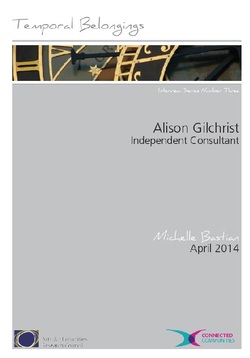 One of the aims of the Temporal Belongings project is to respond to the lack of research available on the interconnection between time and community. As part of this, our AHRC project from 2012 included funding to develop an interview series that would provide new materials for this research area. After a fair few delays I'm now happy to announce that we have started publishing our interviews on the Temporal Belongings website. Our most recent (the third in the series) is available online from today. I speak with Alison Gilchrist, an independent consultant and author of The Well-Connected Community, which explores a networking/systems theory model of community development. You can read this and previous interviews in the series here. 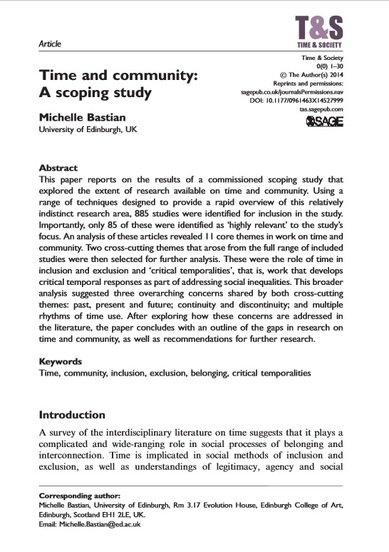 Back in 2011 the AHRC's Connected Communities programme funded a number of research reviews and scoping studies which looked at the question of community from a variety of angles. During my PhD I had found it quite difficult to find material that looked specifically at the relationship between concepts of time and concepts of community and so was keen to scope out what might be available across the wider multi-disciplinary literature. So it was really exciting to get some funding to focus on this and even more exciting to see the results now published with Time and Society. You can find out more about the project, including links to the full bibliography developed as part of the study on the Temporal Belongings website. Professor Graham Crow and his team on the Imagine: Connecting Communities through Research project have funding for two PhD's starting in April 2014. I'll be co-supervisor on one of these which focuses on time and community.
To find out more, including how to apply go to http://www.imaginecommunity.org.uk/node/12 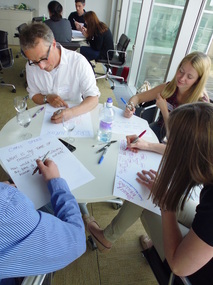 The write up from the recent Festival of Methods for Studying Perceptions of Time is now available on-line. Get an overview of what we got up to, listen to the presentations and have a look at the resources created on the day. Organised by Jen Southern as part of the Sustaining Time project. Speakers include: Rachel Thomson (Sussex), Martin Green (Lancaster), Alex Buchanan (Liverpool), Helen Holmes (Sheffield), Jennifer Whillans (Manchester), Eric Laurier (Edinburgh), James Ash (Northumbria), Jen Southern (Lancaster) and Chris Speed (Edinburgh).  I'm pleased to say that I've finished the write up for the final event from the AHRC- funded Temporal Belongings follow on project which has explored the links between time and community. The workshop was held on the 17-18th January 2013 and its focus was Power, Time and Agency: Exploring the role of critical temporalities. Listen to a wide range of talks from the conference, including keynote speakers Lisa Adkins and Jane Elliott, and see some of the results from our collaborative sessions here 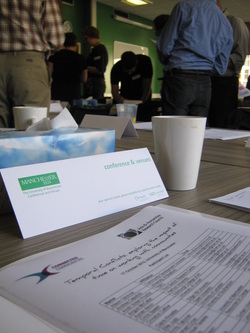 See here for the write up of the second Temporal Belongings workshop held on the 17th October 2012 funded by the AHRC as part of their Connected Communities scheme. This workshop was co-organised with Alison Gilchrist and was called Temporal Conflicts: Exploring the impact of time on working with communities. Listen to a wide-range of non-HEI and HEI speakers and see some of the results from our collaborative sessions. 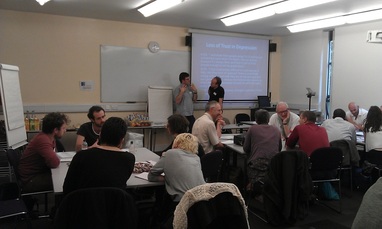 I've just finished the write up for Mobilising Community Futures, or can/should/must we do away with hope? the first workshop in a series funded by the AHRC during 2012-2013. Listen to talks from Davina Cooper (Kent), Matthew Ratcliffe (Durham) and Peter Thompson (Sheffield) and see some of the results from our collaborative sessions here. |
Archives
November 2022
Categories
All
|
||||||||||||||
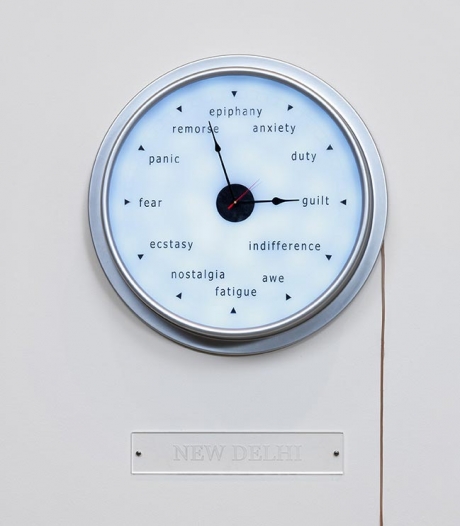
 RSS Feed
RSS Feed
